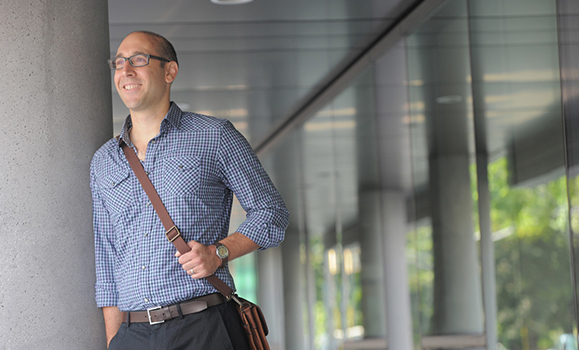Considering that Matthew Schnurr just won a national award for his classroom simulations, you might be surprised how often they fail.
Not ‚Äúfail‚Äù in any catastrophic sense, mind you. It‚Äôs just that his students often don‚Äôt successfully complete the task they‚Äôre trying to achieve ‚Äî¬Ýfor example, completing the mock negotiation of an international environmental agreement.
“What our research has shown is that the learning is actually in the failure,” explains Dr. Schnurr, an associate professor in the Department of International Development Studies (IDS). “Sometimes, confronting our preconceived notions about how easy this stuff is to do, or really understanding how entrenched the different positions are, is an important part of the learning process.”
National recognition
Last year, Dr. Schnurr’s creative approaches to in-course simulation learning earned him .
Now, he’s one of five individuals across Canada to receive the . The national award, established in 2012, is presented by the (STLHE) and recognizes innovative approaches that promote student-centered teaching and learning. Recipients receive funding support to attend two conferences: Brightspace’s own FUSION conference in Washington, D.C. and the annual STLHE conference.
“It’s very humbling, although I do think it’s a bit unfair that it’s an individual award, because so many people contribute to teaching success,” says Dr. Schnurr, citing his former colleague Elizabeth De Santo with whom he first developed classroom simulations in the College of Sustainability, as well as staff in the Centre for Learning and Teaching and other colleagues and TAs in both IDS and Sustainability who’ve played a part in the development of these innovations.
“I’ve had incredible levels of support, and it’s really a collective effort.”
Engagement in and out of the classroom
Simulation learning means different things in different academic programs; in the medical fields, for example, students regularly perform simulated procedures as a training tool. Dr. Schnurr’s simulations aren’t so much about training, although that’s not to say that his students won’t necessarily go on to become the sort of government leaders or NGO representatives they perform as in his classes. The simulations’ value is largely in how they prompt students to confront some of their own understandings about how complicated global environmental issues are to resolve.
“When you’re talking about climate change in the abstract, you’re like, ‘yeah, everyone should be able to get together and just come up with a solution,’” explains Dr. Schnurr. “But when you’re representing the government of Turkey and you have your own domestic issues to balance alongside trade commitments and economic priorities, suddenly it becomes far more difficult to imagine ways in which these totally different stakeholders with distinct priorities could come to a meaningful consensus.”

Dr. Schnurr began using simulations together with Dr. De Santo in an upper-level Sustainability course; subsequently he’s adapted the model to his introductory IDS course. Students not only take on roles in the classroom but online, using learning management software as well as social media to help advance their arguments.
“I’d never done anything quite like it in an academic setting,” says student Meredith Nelson, who is going into her third year of a double major in IDS and Political Science and took part in the IDS simulation this past year. “It helped me to grasp the complexity of international negotiations and to understand the use of social media as a method of public engagement in the development and non-profit sectors… I really enjoyed gaining tangible experience in web design and public engagement.”
“It’s much easier to learn in an engaging setting, where we are encouraged to take on alternative roles to the classic lecture style,” says Rebecca Kingdon, who was also in Dr. Schnurr’s class last year and is now entering the fourth year of her studies in IDS and Sustainability. “Dr. Schnurr truly takes the time to ensure that students have the opportunity to learn and challenge themselves through real-world simulations.”
Studying pedagogy
But do students actually learn better in these sorts of simulations? That’s a question Dr. Schnurr is keen on helping answer. Together with his colleagues, he has published three peer-reviewed papers assessing his classroom exercises using mixed-methods approaches that combine both qualitative and quantitative assessments.
In addition to the insight that the ‚Äúfailure‚Äù to complete the simulations is often a key learning experience, one of the more interesting findings of Dr. Schnurr‚Äôs research is that students often rate their skill competencies ‚Äî¬Ýunderstanding public policy, public speaking, negotiation, mediation ‚Äîlower after the simulations are over.
“Our understanding of that result is not that student proficiencies in things like mediation and negotiation deteriorated due to participation in the simulation, but rather that their initial self-assessment was an overestimate,” explains Dr. Schnurr. “A lot of students think that these things are easier before they get into them. So one of the values of the simulation is that it helps to illustrate how hard it is to operationalize these skills in practice.”
While he continues to assess and refine his current classroom simulations, Dr. Schnurr has also started a group on campus for faculty members to come together and discuss simulation approaches to teaching and learning. The group already has members from seven different faculties, from Computer Science to Health Professions.
“We’re trying to have a more trans-disciplinary conversation on how we use simulations, how we use them in our teaching practice, the value to students, and talk about some of the ways we might learn from each other.”

